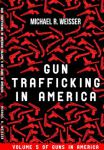Now that the gun lobby has succeeded in getting all 50 states to issue some form of concealed-carry license, the next battle which they want to fight is over gun-free zones. And while states have passed laws liberalizing the possession of concealed weapons in establishments serving liquor, houses of worship and other locations traditionally considered pistole verboten, the locations where pro-gun heat is being turned up are the nation’s college campuses which tend, by and large, to have fairly restrictive policies on students and faculty walking around with guns.
Currently only a handful of states have fairly liberal gun policies in effect, seventeen states forbid guns altogether and the remainder leave it up to individual school option, but in most such places a no-gun policy tends to be the rule. You would think, incidentally, that states with blanket prohibitions against guns would be located in the Northeast and other parts of the country that both lean liberal and don’t have high percentages of residents who own guns. In fact, more than half of the strongest, no-guns-on-campus states are located in the South, where gun laws in general tend to be the least strict. Even Florida, known as the “gunshine” state, forbids guns on all college campuses; ditto Georgia which last year opened up all sorts of public locations to concealed carry of guns.
 The campaign to allow guns on campus recently hit the national news when state legislators in Florida and Nevada introduced pro-gun campus bills and linked the necessity for ending gun-free college zones to what continues to be a complicated and hot-button issue; namely, the question of campus rape. The sponsor of the Nevada bill, Michele Fiore (R-Las Vegas) may have stuck her foot a little too far into her mouth when she referred to the “hot little girls on campus” who needed to protect themselves, and in case you’re still wondering, her reference to heat had nothing to do with staying outside in the sun.
The campaign to allow guns on campus recently hit the national news when state legislators in Florida and Nevada introduced pro-gun campus bills and linked the necessity for ending gun-free college zones to what continues to be a complicated and hot-button issue; namely, the question of campus rape. The sponsor of the Nevada bill, Michele Fiore (R-Las Vegas) may have stuck her foot a little too far into her mouth when she referred to the “hot little girls on campus” who needed to protect themselves, and in case you’re still wondering, her reference to heat had nothing to do with staying outside in the sun.
The issue of campus rape keeps bubbling back and forth between those who claim that the numbers don’t justify all the recent concern, as opposed to those who declare with equal certainty that the numbers are meaningless because young women, particularly on campuses with large residential populations, are afraid to come forward and report a rape. Much campus sexual assaults occur during ‘animal house’-style parties, and while collage administrations are on notice to be more diligent in monitoring dangerous behavior, no educational institution wants to be considered just a party school whose lack of campus security puts students at risk.
One group that has used the campus rape issue to increase its visibility and perhaps its membership is a group called Students for Concealed Carry, which claims to have more than 40,000 members which is pretty close to the number of ‘likes’ on their Facebook page. The group gets lots of promotional help from the NRA (gee – what a surprise) and while they tend to promote their demand for campus gun rights as part of a loosely-defined libertarianism, their website motto states explicitly that guns are “an effective means of self defense.”
I really don’t know anything about sexual assault so I’ll let other experts explain the ins and outs as well as the various theories for the prevention of same. But I do know something about guns and I also know a lot about whether guns represent, a la the SCC website, an “effective” means of defense. And the truth is that guns do represent an effective means of defense against assaults, but they are no more effective than other methods, such as running away or calling for help. And this isn’t my opinion, it’s research published by the pro-gun criminologist Gary Kleck. And the good news about calling for help is that a droid can’t do much damage if it falls into the wrong hands. Can anyone say that about guns?
Thanks Sue.
Available on Amazon.

Recent Comments